从交际语境顺应论谈商务英语信函中模糊语言的翻译
- 格式:pdf
- 大小:955.10 KB
- 文档页数:2
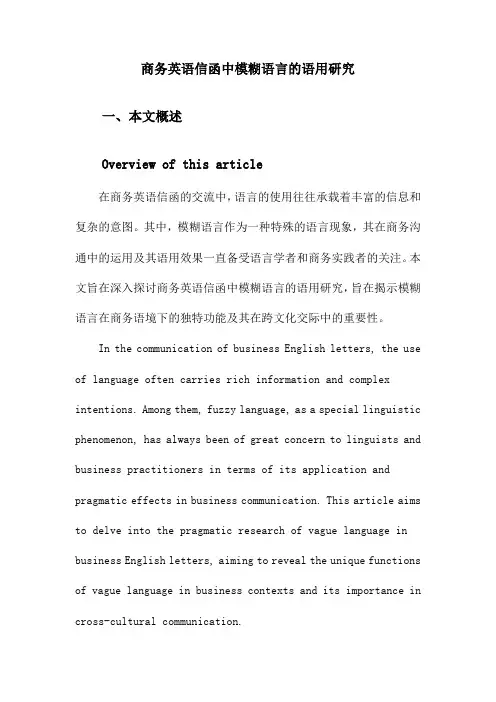
商务英语信函中模糊语言的语用研究一、本文概述Overview of this article在商务英语信函的交流中,语言的使用往往承载着丰富的信息和复杂的意图。
其中,模糊语言作为一种特殊的语言现象,其在商务沟通中的运用及其语用效果一直备受语言学者和商务实践者的关注。
本文旨在深入探讨商务英语信函中模糊语言的语用研究,旨在揭示模糊语言在商务语境下的独特功能及其在跨文化交际中的重要性。
In the communication of business English letters, the use of language often carries rich information and complex intentions. Among them, fuzzy language, as a special linguistic phenomenon, has always been of great concern to linguists and business practitioners in terms of its application and pragmatic effects in business communication. This article aims to delve into the pragmatic research of vague language in business English letters, aiming to reveal the unique functions of vague language in business contexts and its importance in cross-cultural communication.本文将首先界定模糊语言的概念,并阐述其在商务语境下的普遍性和必然性。
接着,文章将分析模糊语言在商务英语信函中的常见类型,如使用不确定的词汇、采用委婉的表达方式、借助模糊限制语等。
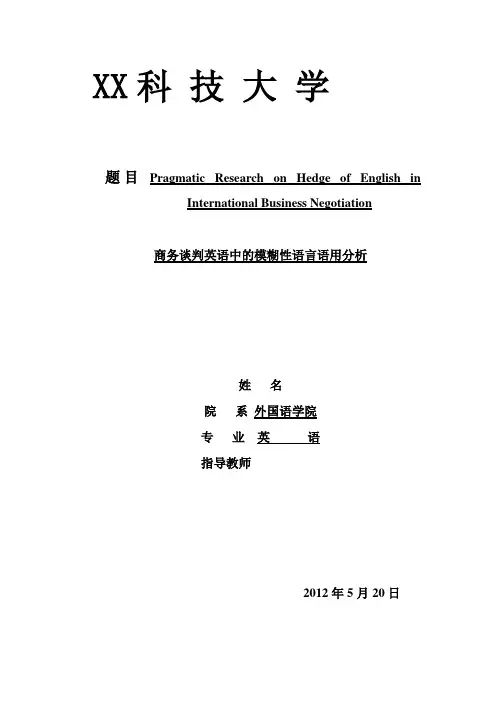
XX科技大学题目Pragmatic Research on Hedge of English inInternational Business Negotiation商务谈判英语中的模糊性语言语用分析姓名院系外国语学院专业英语指导教师2012年5月20日AbstractHedge is the essence of the natural language. As an important component and general phenomenon of language which reflects the objective world and expresses human thoughts, hedge is widely used in various aspects and fields. Up till now, Chinese and foreign researchers have carried out many researches on hedge in language, mainly about the semantics, motives, and discourse analysis. However, there are still few systematic studies on pragmatic significance and positive pragmatic functions of hedge in business conversation which is the main concern of this essay.In section one, this article gives the definitions and the research achievements about hedge home and aboard,then it discriminates some similar definitions. Section two studies the application of hedge to business English. Section three gives pragmatic interpretation on hedge in business English. Section four concentrates on the pragmatic effects of hedge in English for business negotiation.The final part is the conclusion, summarizing the research content, importance and the limitations in the present research.KEY WORDS: hedge; business English negotiation;pragmatic interpretation摘要模糊性是自然语言的属性。
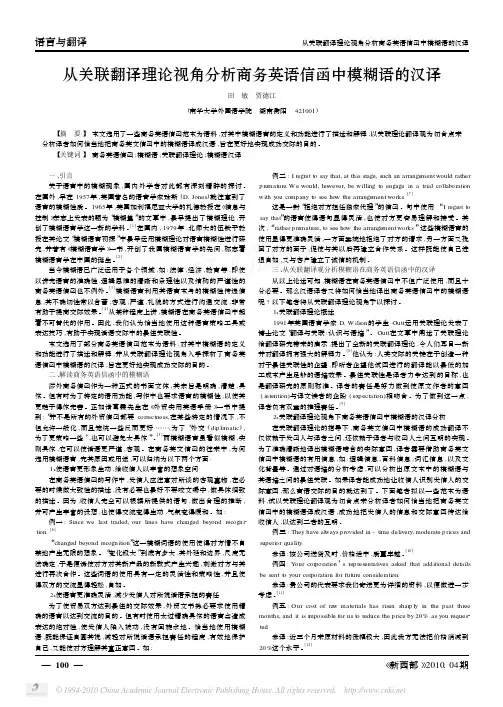
从关联翻译理论视角分析商务英语信函中模糊语的汉译田 敏 贾德江(南华大学外国语学院 湖南衡阳 421001)【摘 要】 本文选用了一些商务英语信函范本为语料,对其中模糊语言的定义和功能进行了描述和解释,以关联理论翻译观为切合点来分析译者如何恰当地把商务英文信函中的模糊语译成汉语,旨在更好地实现成功交际的目的。
【关键词】 商务英语信函;模糊语;关联翻译理论;模糊语汉译 一、引言关于语言中的模糊现象,国内外学者对此都有深刻精辟的探讨。
在国外,早在1957年,英国著名的语音学家琼斯(D.Jones)就注意到了语言的模糊性质。
1965年,美国加利福尼亚大学的札德教授在《信息与控制》杂志上发表的题为“模糊集”的文章中,最早提出了模糊理论,开创了模糊语言学这一新的学科。
[1]在国内,1979年,北师大的伍铁平教授在其论文“模糊语言初探”中最早运用模糊理论对语言模糊性进行研究,并著有《模糊语言学》一书,开创了我国模糊语言学的先河,标志着模糊语言学在中国的诞生。
[2]当今模糊语已广泛运用于各个领域,如:法律,经济,教育等,即使以讲究语言的准确性,逻辑思维的清晰和条理性以及结构的严谨性的商务英语信函也不例外。
[3]模糊语言利用其语言本身的模糊性传递信息,其不确切性常以含蓄,客观,严谨,礼貌的方式进行沟通交流,非常有助于提高交际效果。
[4]从某种程度上讲,模糊语在商务英语信函中起着不可替代的作用。
因此,我们认为恰当地使用这种语言策略工具或表达技巧,有助于实现话语交际中的最佳关联性。
本文选用了部分商务英语信函范本为语料,对其中模糊语的定义和功能进行了描述和解释,并从关联翻译理论视角入手探析了商务英语信函中模糊语的汉译,旨在更好地实现成功交际的目的。
二、解读商务英语信函中的模糊语涉外商务信函作为一种正式的书面文体,其宗旨是明确,清楚,具体。
但有时为了特定的语用功能,写作中也要求语言的模糊性,以使其更趋于得体完善。
正如诸葛霖先生在《外贸实用英语手册》一书中提到:“并不是所有的外贸信函都要correctness,在某些特定的情况下,不但允许一般化,而且笼统一些反而更好……,为了‘外交(di p l omatic),为了更策略一些’,也可以避免太具体”。
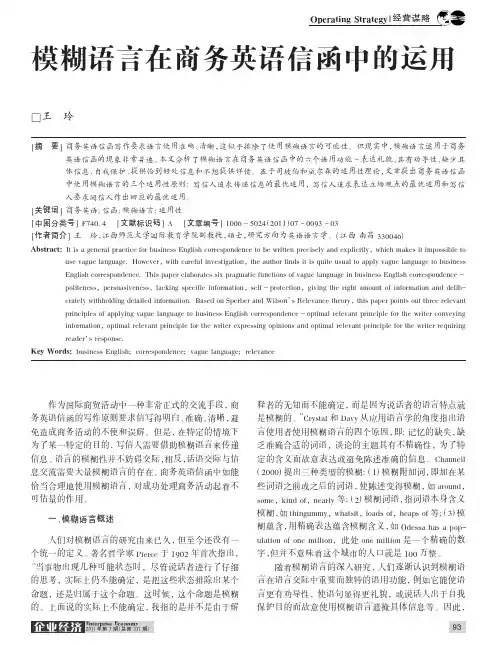
E nterprise E conomy2011年第7期(总第371期)模糊语言在商务英语信函中的运用□王玲[摘要]商务英语信函写作要求语言使用准确、清晰,这似乎排除了使用模糊语言的可能性。
但现实中,模糊语言运用于商务英语信函的现象非常普遍。
本文分析了模糊语言在商务英语信函中的六个语用功能-表达礼貌、具有劝导性、缺少具体信息、自我保护、提供恰到好处信息和不想提供详情。
基于司坡伯和威尔森的适用性理论,文章提出商务英语信函中使用模糊语言的三个适用性原则:写信人追求传递信息的最优适用,写信人追求表达立场观点的最优适用和写信人要求阅信人作出回应的最优适用。
[关键词]商务英语;信函;模糊语言;适用性[中图分类号]F740.4[文献标识码]A[文章编号]1006-5024(2011)07-0093-03[作者简介]王玲,江西师范大学国际教育学院副教授,硕士,研究方向为英语语言学。
(江西南昌330046)Abstract:It is a general practice for business English correspondence to be written precisely and explicitly,which makes it impossible touse vague language.However,with careful investigation,the author finds it is quite usual to apply vague language to business English correspondence.This paper elaborates six pragmatic functions of vague language in business English correspondence -politeness,persuasiveness,lacking specific information,self -protection,giving the right amount of information and delib-erately withholding detailed information.Based on Sperber and Wilson s Relevance theory,this paper points out three relevant principles of applying vague language to business English correspondence -optimal relevant principle for the writer conveying information,optimal relevant principle for the writer expressing opinions and optimal relevant principle for the writer requiring reader s response.Key Words:business English;correspondence;vague language;relevance作为国际商贸活动中一种非常正式的交流手段,商务英语信函的写作原则要求信写得明白、准确、清晰,避免造成商务活动的不便和误解。
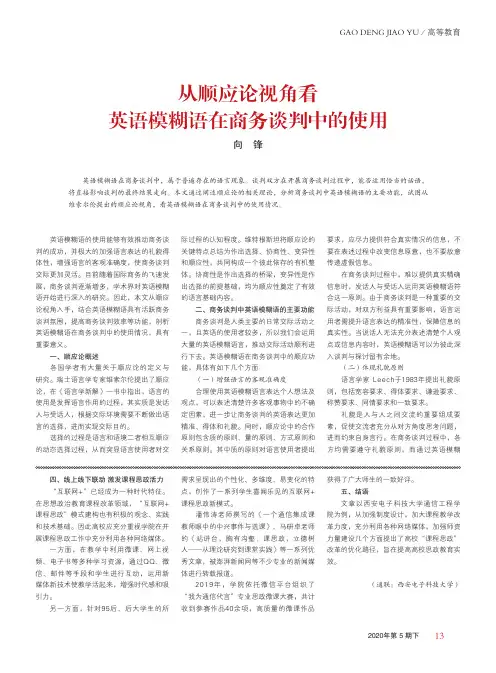
GAO DENG JIAO YU/高等教育四、线上线下联动 激发课程思政活力“互联网+”已经成为一种时代特征。
在思想政治教育课程改革领域,“互联网+课程思政”模式建构也有积极的观念、实践和技术基础。
因此高校应充分重视学院在开展课程思政工作中充分利用各种网络媒体。
一方面,在教学中利用微课、网上视频、电子书等多种学习资源,通过QQ、微信、邮件等手段和学生进行互动,运用新媒体新技术使教学活起来,增强时代感和吸引力。
另一方面,针对95后、后大学生的所需求呈现出的个性化、多维度、易变化的特点,创作了一系列学生喜闻乐见的互联网+课程思政新模式。
潘伟涛老师撰写的《一个通信集成课教师眼中的中兴事件与选课》、马研卓老师的《站讲台,胸有沟壑;课思政,立德树人——从理论研究到课堂实践》等一系列优秀文章,被澎湃新闻网等不少专业的新闻媒体进行转载报道。
2019年,学院依托微信平台组织了“我为通信代言”专业思政微课大赛,共计收到参赛作品40余项,高质量的微课作品获得了广大师生的一致好评。
五、结语文章以西安电子科技大学通信工程学院为例,从加强制度设计,加大课程教学改革力度,充分利用各种网络媒体,加强师资力量建设几个方面提出了高校“课程思政”改革的优化路径,旨在提高高校思政教育实效。
(通联:西安电子科技大学)从顺应论视角看英语模糊语在商务谈判中的使用向 锋英语模糊语的使用能够有效推动商务谈判的成功,并极大的加强语言表达的礼貌得体性,增强语言的客观准确度,使商务谈判交际更加灵活。
目前随着国际商务的飞速发展,商务谈判逐渐增多,学术界对英语模糊语开始进行深入的研究。
因此,本文从顺应论视角入手,结合英语模糊语具有活跃商务谈判氛围,提高商务谈判效率等功能,剖析英语模糊语在商务谈判中的使用情况,具有重要意义。
一、顺应论概述各国学者有大量关于顺应论的定义与研究。
瑞士语言学专家维索尔伦提出了顺应论,在《语言学新解》一书中指出,语言的使用是发挥语言作用的过程,其实质是发话人与受话人,根据交际环境需要不断做出语言的选择,进而实现交际目的。
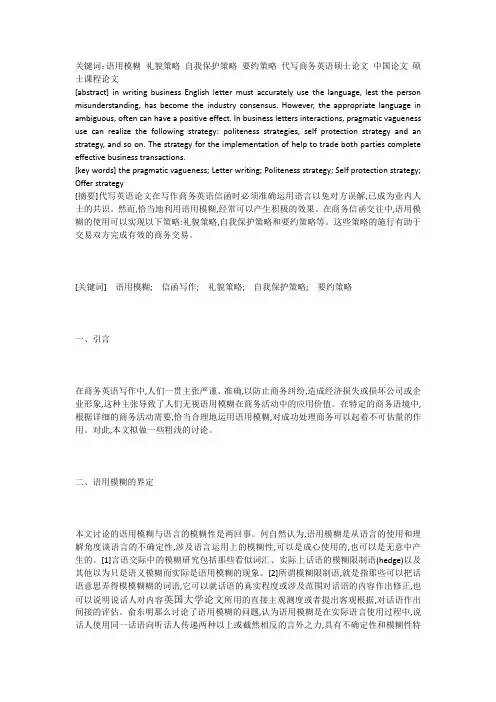
关键词:语用模糊礼貌策略自我保护策略要约策略代写商务英语硕士论文中国论文硕士课程论文[abstract] in writing business English letter must accurately use the language, lest the person misunderstanding, has become the industry consensus. However, the appropriate language in ambiguous, often can have a positive effect. In business letters interactions, pragmatic vagueness use can realize the following strategy: politeness strategies, self protection strategy and an strategy, and so on. The strategy for the implementation of help to trade both parties complete effective business transactions.[key words] the pragmatic vagueness; Letter writing; Politeness strategy; Self protection strategy; Offer strategy[摘要]代写英语论文在写作商务英语信函时必须准确运用语言以免对方误解,已成为业内人士的共识。
然而,恰当地利用语用模糊,经常可以产生积极的效果。
在商务信函交往中,语用模糊的使用可以实现以下策略:礼貌策略,自我保护策略和要约策略等。
这些策略的施行有助于交易双方完成有效的商务交易。
[关键词]语用模糊;信函写作;礼貌策略;自我保护策略;要约策略一、引言在商务英语写作中,人们一贯主张严谨、准确,以防止商务纠纷,造成经济损失或损坏公司或企业形象,这种主张导致了人们无视语用模糊在商务活动中的应用价值。
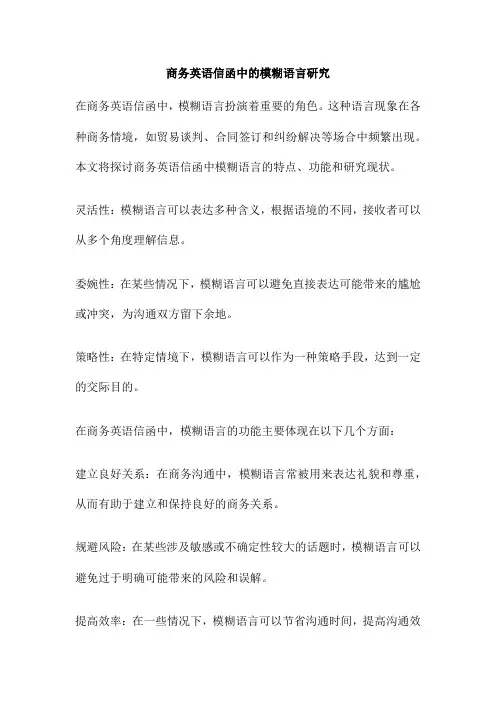
商务英语信函中的模糊语言研究在商务英语信函中,模糊语言扮演着重要的角色。
这种语言现象在各种商务情境,如贸易谈判、合同签订和纠纷解决等场合中频繁出现。
本文将探讨商务英语信函中模糊语言的特点、功能和研究现状。
灵活性:模糊语言可以表达多种含义,根据语境的不同,接收者可以从多个角度理解信息。
委婉性:在某些情况下,模糊语言可以避免直接表达可能带来的尴尬或冲突,为沟通双方留下余地。
策略性:在特定情境下,模糊语言可以作为一种策略手段,达到一定的交际目的。
在商务英语信函中,模糊语言的功能主要体现在以下几个方面:建立良好关系:在商务沟通中,模糊语言常被用来表达礼貌和尊重,从而有助于建立和保持良好的商务关系。
规避风险:在某些涉及敏感或不确定性较大的话题时,模糊语言可以避免过于明确可能带来的风险和误解。
提高效率:在一些情况下,模糊语言可以节省沟通时间,提高沟通效率。
近年来,随着跨文化商务沟通的增多,商务英语信函中的模糊语言现象引起了越来越多研究者的。
研究者们从不同角度对模糊语言进行了深入探讨,主要包括以下几个方面:语境与模糊语言:研究者们研究了语境对模糊语言理解和使用的影响,以及如何根据不同的语境选择合适的模糊语言。
文化与模糊语言:有研究表明,不同文化背景的商务人员在模糊语言的运用上存在差异。
因此,跨文化角度的模糊语言研究逐渐成为热点。
模糊语言的语用策略:一些研究者从语用策略角度出发,探讨了商务英语信函中如何运用模糊语言达到有效沟通、规避风险等目的。
模糊语言的翻译与解读:由于不同语言之间的差异,模糊语言的翻译和解读一直是研究的难点。
研究者们对如何准确翻译和解读商务英语信函中的模糊语言进行了深入研究。
商务英语信函中的模糊语言研究具有重要意义。
通过对模糊语言的深入了解和研究,可以帮助商务人员更好地掌握跨文化商务沟通的技巧,提高商务英语应用能力,从而在日益全球化的商业环境中取得更好的业务成果。
在商业交流中,精确、明确的沟通方式一直是主流。
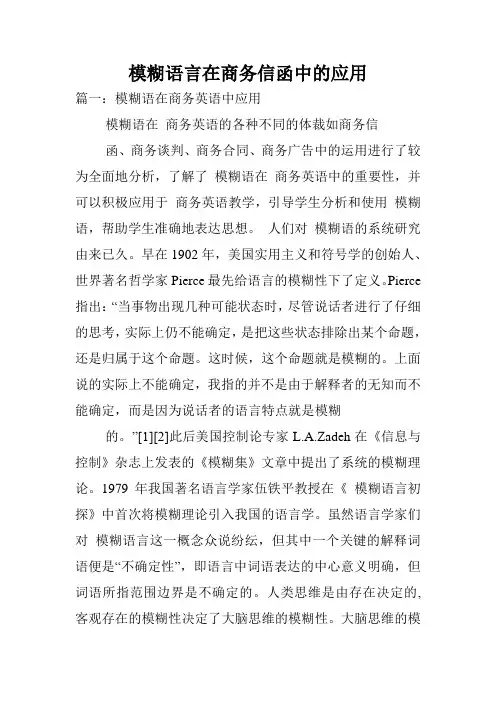
模糊语言在商务信函中的应用篇一:模糊语在商务英语中应用模糊语在商务英语的各种不同的体裁如商务信函、商务谈判、商务合同、商务广告中的运用进行了较为全面地分析,了解了模糊语在商务英语中的重要性,并可以积极应用于商务英语教学,引导学生分析和使用模糊语,帮助学生准确地表达思想。
人们对模糊语的系统研究由来已久。
早在1902年,美国实用主义和符号学的创始人、世界著名哲学家Pierce最先给语言的模糊性下了定义。
Pierce 指出:“当事物出现几种可能状态时,尽管说话者进行了仔细的思考,实际上仍不能确定,是把这些状态排除出某个命题,还是归属于这个命题。
这时候,这个命题就是模糊的。
上面说的实际上不能确定,我指的并不是由于解释者的无知而不能确定,而是因为说话者的语言特点就是模糊的。
”[1][2]此后美国控制论专家L.A.Zadeh在《信息与控制》杂志上发表的《模糊集》文章中提出了系统的模糊理论。
1979年我国著名语言学家伍铁平教授在《模糊语言初探》中首次将模糊理论引入我国的语言学。
虽然语言学家们对模糊语言这一概念众说纷纭,但其中一个关键的解释词语便是“不确定性”,即语言中词语表达的中心意义明确,但词语所指范围边界是不确定的。
人类思维是由存在决定的,客观存在的模糊性决定了大脑思维的模糊性。
大脑思维的模糊性决定了语言的模糊性。
因此正是客观事物本身的模糊性和对客观世界认识的不确定性决定了我们无法避免语言的模恰当,更能达到交流的目的。
模糊语在日常交际或文学用语中的运用比较普遍,即便在科技、商务等领域中,诸如商务英语中,模糊语的运用也屡见不鲜。
商务英语,作为一种专门用途英语,具有其特殊的语言风格,尽管要求语言表达严谨准确,但是适度地使用模糊语,不但不会影响商务英语表达的准确性,还可以使商务英语表达更灵活、生动、形象、准确,同时显得更严谨、准确、礼貌、得体。
它体现在商务英语的商务信函、商务谈判、商务合同等各种不同的体裁中,发挥其积极的语用功能。
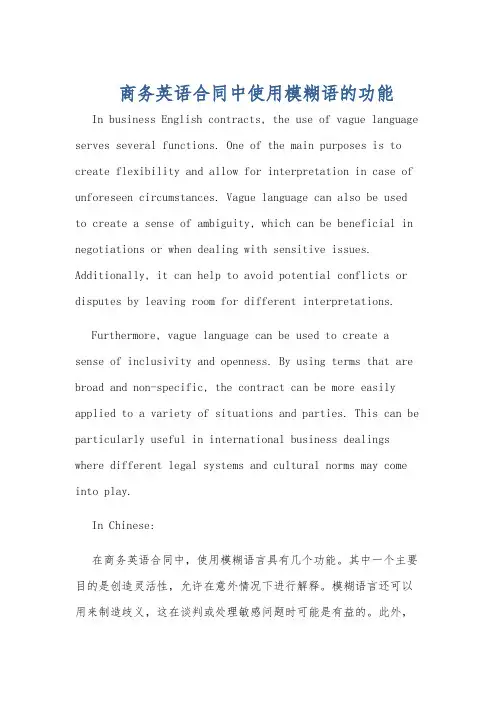
商务英语合同中使用模糊语的功能In business English contracts, the use of vague language serves several functions. One of the main purposes is to create flexibility and allow for interpretation in case of unforeseen circumstances. Vague language can also be used to create a sense of ambiguity, which can be beneficial in negotiations or when dealing with sensitive issues. Additionally, it can help to avoid potential conflicts or disputes by leaving room for different interpretations.Furthermore, vague language can be used to create a sense of inclusivity and openness. By using terms that are broad and non-specific, the contract can be more easily applied to a variety of situations and parties. This can be particularly useful in international business dealings where different legal systems and cultural norms may come into play.In Chinese:在商务英语合同中,使用模糊语言具有几个功能。
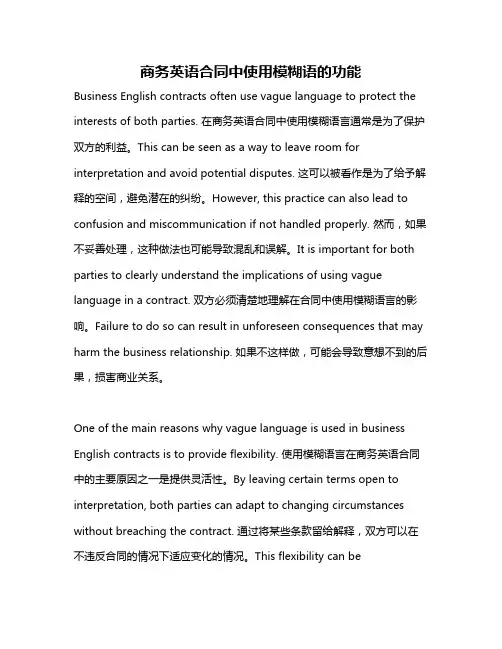
商务英语合同中使用模糊语的功能Business English contracts often use vague language to protect the interests of both parties. 在商务英语合同中使用模糊语言通常是为了保护双方的利益。
This can be seen as a way to leave room for interpretation and avoid potential disputes. 这可以被看作是为了给予解释的空间,避免潜在的纠纷。
However, this practice can also lead to confusion and miscommunication if not handled properly. 然而,如果不妥善处理,这种做法也可能导致混乱和误解。
It is important for both parties to clearly understand the implications of using vague language in a contract. 双方必须清楚地理解在合同中使用模糊语言的影响。
Failure to do so can result in unforeseen consequences that may harm the business relationship. 如果不这样做,可能会导致意想不到的后果,损害商业关系。
One of the main reasons why vague language is used in business English contracts is to provide flexibility. 使用模糊语言在商务英语合同中的主要原因之一是提供灵活性。
By leaving certain terms open to interpretation, both parties can adapt to changing circumstances without breaching the contract. 通过将某些条款留给解释,双方可以在不违反合同的情况下适应变化的情况。
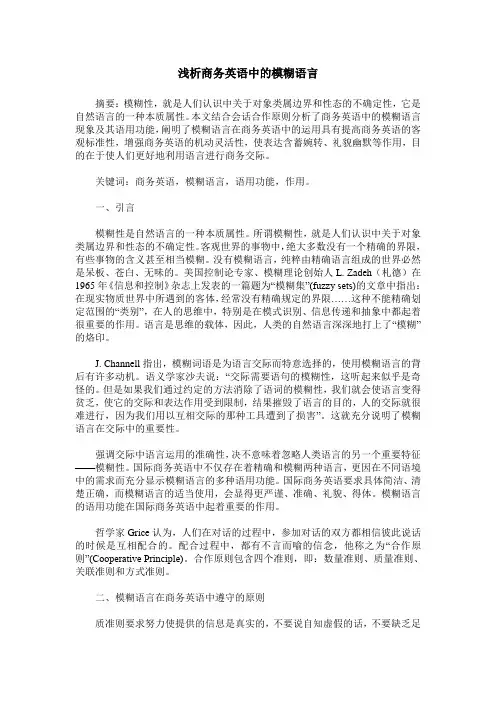
浅析商务英语中的模糊语言摘要:模糊性,就是人们认识中关于对象类属边界和性态的不确定性,它是自然语言的一种本质属性。
本文结合会话合作原则分析了商务英语中的模糊语言现象及其语用功能,阐明了模糊语言在商务英语中的运用具有提高商务英语的客观标准性,增强商务英语的机动灵活性,使表达含蓄婉转、礼貌幽默等作用,目的在于使人们更好地利用语言进行商务交际。
关键词:商务英语,模糊语言,语用功能,作用。
一、引言模糊性是自然语言的一种本质属性。
所谓模糊性,就是人们认识中关于对象类属边界和性态的不确定性。
客观世界的事物中,绝大多数没有一个精确的界限,有些事物的含义甚至相当模糊。
没有模糊语言,纯粹由精确语言组成的世界必然是呆板、苍白、无味的。
美国控制论专家、模糊理论创始人L. Zadeh(札德)在1965年《信息和控制》杂志上发表的一篇题为“模糊集”(fuzzy sets)的文章中指出:在现实物质世界中所遇到的客体,经常没有精确规定的界限……这种不能精确划定范围的“类别”,在人的思维中,特别是在模式识别、信息传递和抽象中都起着很重要的作用。
语言是思维的载体,因此,人类的自然语言深深地打上了“模糊”的烙印。
J. Channell指出,模糊词语是为语言交际而特意选择的,使用模糊语言的背后有许多动机。
语义学家沙夫说:“交际需要语句的模糊性,这听起来似乎是奇怪的。
但是如果我们通过约定的方法消除了语词的模糊性,我们就会使语言变得贫乏,使它的交际和表达作用受到限制,结果摧毁了语言的目的,人的交际就很难进行,因为我们用以互相交际的那种工具遭到了损害”。
这就充分说明了模糊语言在交际中的重要性。
强调交际中语言运用的准确性,决不意味着忽略人类语言的另一个重要特征——模糊性。
国际商务英语中不仅存在着精确和模糊两种语言,更因在不同语境中的需求而充分显示模糊语言的多种语用功能。
国际商务英语要求具体简洁、清楚正确,而模糊语言的适当使用,会显得更严谨、准确、礼貌、得体。
ENGLISH ON CAMPUS2023年04期总第652期书包含187 篇真实的商务英语信函和电子邮件,教师可使用其中的商务英语信函实例为学生提供相应写作指导。
(二)商务英语信函写作中模糊语言的主要语用功能没有商务信函,商业贸易就很难顺利和成功地进行。
因此,善用商务信函是非常重要的,而模糊语言的使用有助于实现某些语用功能,达成一定的沟通目的。
教师可以通过分析《国际商贸书信大全》中的信函实例,来研究商务英语信函中模糊语言的语用功能。
经过对信函文本的仔细分析,笔者发现商务英语信函中模糊语言有五个主要的语用功能。
1.提高文本可信度和表达的客观性。
适当地使用模糊语言可以提高文章的准确性。
模糊语言的 “模糊”是指通过扩大词语的范围,为被描述的对象提供一个更广泛的范围,而不是指 “模糊不清”。
由于主体的不确定性,有时很难使用具体的词语来描述,过于具体的词反而可能使描述变得片面。
而有效地使用模糊语言可以使商务英语信函的表达更礼貌、更精确、更恰当。
在沟通交流中,有时需要说服或拒绝别人,需要在沟通过程中体现出我方话语的可信度,促使双方互相信任,从而促进沟通的有效进行。
例1:In view of the collapse in the market for your Minimaniac doll, we can no longer undertake to distribute it.译文:鉴于贵公司迷你娃娃销售市场的崩溃,我方将终止销售该产品的业务。
分析:在这个例子中,写作者想要终止与客户的业务关系。
在终止业务关系时,需要很好地去解释为什么作出这个决定。
值得注意的是,因为双方将来仍可能合作,所以要尊重对方,给他们留下良好的印象。
因此作者用“In view of”(意为“鉴于”)来解释自己公司作出这个决定是有充分证据的。
这个决定是根据对方在过去一个阶段不乐观的销售业绩作出的,这是真实且客观的。
这样一来,对方能更好接受终止合作的决定。
Bi Ye Lun Wen(20_ _届)英语模糊语在商务英语信函中的语用功能The Pragmatic Function of Vague Language in Business Correspondence摘要模糊与精确是人类语言的两种基本属性。
“模糊”的概念和理论自从提出后的几十年里,人们对模糊语言进行了系统的研究。
商务英语信函一贯要求内容和信息准确,所以商务英语信函中的模糊语一直被忽略了。
本文从四个方面对模糊语之前的研究进行了归纳,然后对商务英语信函做出分析。
最后探讨了以下两个问题:(1)不同类型的英语商务信函中模糊语的使用情况(2)在英语商务信函中模糊语具有哪些功能。
从对相关英语商务信函的分析和研究,模糊语在中性或好消息,传递不愉快和不确定答复的信息和说服信三种信函中,运用是不同的。
而且模糊语言在商务交际中有四个语用功能:使商务语言更礼貌和更有说服性;提高商务语言的灵活性,增强商务语言的正确性和提高写信人自我保护功能。
关键词:模糊;模糊语;商务信函;语用功能。
IIIAbstractVagueness and precision are the basic attributes of human language. Since the concept and theory of vague language was proposed by L.A Zadeh in 1965, much has been done in systematic and descriptive study of vague language. Business English has always been required to be clear and concrete, so the study of vague language in this field has long been neglected. The author takes a review of previous research on vague language from four perspectives and then makes an analysis on the business correspondence. This study attempts to explore the following two questions :( 1) How does the addresser use vague language in different type of business correspondence?(2)What pragmatic functions does the vague language make in business correspondence? Based on the definition and delimitation of vague language in the present study and the analysis of the data, it is found that the use of vague language is different in good-news and neutral letters, bad-news letter and persuasive letters. Vague language has four pragmatic functions in written business communication: (1) making the writing more polite and persuasive, enhancing the flexibility of business language, making the expression more accurate, and ensuring self-protection.Key words: vague; vague language; business correspondence; pragmatic function.IVContentsAbstract (Ⅱ)1Introduction (1)1.1Overview (1)1.2 Rationale of the present study (1)1.3 The specific research questions (2)1.4 Outline of the thesis (3)2 Review of previous research on vague language (3)2.1 Pragmatic perspective (3)2.2 Philosopher perspective (3)2.3 Psychological perspective (3)2.4 Semantic perspective (4)3 Business correspondences (4)3.1 Definition of business correspondence (4)3.2 Classification of business correspondence (5)3.3 Principle for business writing (5)4 Specific contexts of using vague language in business correspondence (6)4.1 Employment of vague language in good-news and neutral letters (6)4.2 Employment of vague language in bad-news letter (8)4.3 Employment of vague language in persuasive letters (9)5 Four pragmatic functions of vague language in business correspondence (10)5.1 Making the writing more polite and persuasive (11)5.2 Enhancing the flexibility of business language (12)5.3 Making the expression more accurate (13)5.4 Ensuring Self-Protection (13)6 Conclusion (14)6.1 Major findings (14)6.2 Implications (14)6.3 Suggestion for further study (15)Bibliography (16)Acknowledgements (17)1.IntroductionVagueness and precision are the basic attributes of human language, both of them are very important. Precision is needed most of time when people want to express emotion, while vagueness also plays an important role because some things are vague. In fact, vague language doesn’t affect communication; on the contrary, it has special functions, making the words more polite and flexible. As the development of international business, people pay more attention on the vague language in business corresponds. In the present thesis, the author finds that vague language is used to realize the addresser’s communicative intention, and it is the result of the adaptation to various contexts.1.1OverviewSince Zadeh first proposed the concept and theory of vague language, people have done much systematic descriptive study on vague language. Many linguists think vague language play an important role in communication. Whether one can properly use vague language shows one’s language perfo rmance, because vague language is an inseparable part of language communication.(Zhang, 1998)It can be easily found that vague language has always been used as a communicative strategy in business activities. The addresser shows his communicative attention by it. And it also provides addressee with a guideline for understanding the addresser’s intentions. Crystal and Davy (1975) give four reasons for vagueness: (a) memory loss- the speaker forgets the correct word; (b) the language has no suitable exact word, or the speaker does not know it; (c) the subject of the conversation is not such that is requires precision, and an approximation or characterization will do; (d) the choice of a vague item is deliberate to maintain the atmosphere. Channel (2000) arg ues that “vagueness in language is neither all ‘bad’ nor all ‘good’. What matters is that vague language is used appropriately.” If it is used properly, vague language would lead unexpected success.1.2 Rationale of present studyThe author chooses the vague language in business corresponds as the object of the present study mainly because of the following reasons.Firstly, although vague language has been accepted extensively, and the researches about it are more and more, there is still a little research about the vague language in business corresponds. Maybe it is because the traditional idea that business corresponds should be clearly and accurately without any ambiguity. However this study argues that proper vague language has the special characteristics other words can’t instead.Secondly, the study on vague language in business corresponds has practical significant. People can use vague language perfectly if they comprehend it. The addresser can show his intention with vague language and the reader can understanding the real mean of the letter.Thirdly, in traditional opinion, writing business corresponds should follow 7Cs principle, that is, be clear, concise, correct, courteous, conversational, convincing and complete. However, in some situation, the 7Cs can’t meet the demand because not everything in business is certain. Sometimes, people will adopt vague language rather than follow strictly the 7Cs so as to avoid unnecessary disputes or to facilitate business deal.1.3 The specific research questionThe present study has focused on the employment of vague language in business correspondence, and in so doing, it has set out to work towards answers to the following two questions:1. How does the addresser use vague language in different type of business correspondence?2. What pragmatic functions does the vague language make in business correspondence?1.4 Outline of the thesisThis thesis consists of six chapters. Chapter one is a general picture of the vague language. It introduces the vague language and the rational of the study and the research questions. Chapter two is a review of previous research on vague language. And the author mainly focuses on pragmatic perspective. Chapter three gives a research on business correspondence. And it mainly focuses on the classification of business correspondence and 7C principles in business correspondence writing. Chapter four describes the different use of vague language in different type ofbusiness correspondence. In this chapter, the author uses many business correspondences as examples to show that vague language used in each type of letter is the result of adaptation to its specific context. The employment frequency is different in good-news and neutral letters, bad-news letter and persuasive letters. In chapter five, the author gets four pragmatic function of vague language in business correspondence: making the writing more polite and persuasive, enhancing the flexibility of business language, making the expression more accurate, and ensuring self-protection. The chapter six is a conclusion which summarizes the major findings of the present study. At the same time, some suggestions are provided for further research on vague language.2 Review of Previous Research on Vague LanguageThe following is a brief survey of the related studies on vague language since the present study is about the employment of vague language in written business discourse. Vague language is an interdisciplinary subject with four perspectives, namely philosophical perspective, psychological perspective, semantic perspective and pragmatic perspective. And it will mainly focus on pragmatic perspective.2.1 Pragmatic perspectiveWhat pragmatics focuses on is the relationship between language and language users, and the pragmatic principle of the language. Atmosphere is very important to this relationship. People always enhance the speaking effect with vague language.Channel is one of the most famous linguist in this aspect. She thinks that using vague language is a language policy for native English speakers. In her vague language, Channel lists eight situations or purposes for people to use vague language: giving the right amount of information; deliberate withholding information; lexical gaps; lacking specific information; displacement; self-protection; power and politeness; information and atmosphere; women’s language(Channel,2000:194). The vague language’s pragmatic function can be seen from the above review. And a pragmatic perspective is necessary in the present study for the purpose of exploring the pragmatic function of vague language.2.2 Philosophical perspectiveWith the linguistic turn of philosophy at the end of nineteenth century, some attention is drawn to the phenomenon of vagueness of natural language in the philosophical circle (Ballmer & Pinkal, 1983:2). Philosophers have concentrated on the origin of vagueness, and they have worked hard to solve the problems of “why natural language has such property as ‘vagueness’ and how this property is handled”.2.3 Psychological perspectiveActually, vague language is less analyzed from the psychological perspective .But there are still some research. Psycholinguists focus on the question of how ambiguous sentences are comprehended in spoken and written discourse. It is viewed by psycholinguistics that potential ambiguity, which is considered as a kind of reflection of vagueness in our terms, is pervasive and ubiquitous in natural language.2.4 Semantic perspectiveMuch attention has been paid on the vague language in the field of formal semantics. Truth-conditional semantics which aims to describe the meaning of sentences in terms of the conditions usually operates with three truth value: true, false, and lacking a true value.3 Business CorrespondenceSince it is a research on vague language in business correspondence, it is necessary to have a general idea about what business correspondence is and what its characteristic is.3.1 Definition of business correspondenceBusiness refers to all the activities of buying and selling goods or services. Business correspondence is one of the basic means of communication in international trade. It used to sell products or services, request material or information, answer customer inquiries, maintain good public relations, and serve a variety of other business function. In order to write effective business correspondence, it is quite essential we have a good understanding of the language characteristics and some principle of business correspondence so as to establish relationship and get a satisfactory result.3.2 Classification of business correspondenceBusiness correspondence may be classified from various angles. The most common ways of classification are as follows:The first one is classified based on the content of the correspondence as follows: request correspondences, correspondences answering requests, claim and adjustment correspondences, credit and collection correspondence, sale correspondences, employment correspondences and social business correspondences, etc(Stewart, 1984: 380-381)The second one is classified based on the different functions in the process of a business transaction. There are correspondences for establishment of business relations, correspondences for the enquiry of business, quotation correspondences, negotiating correspondences, confirming order correspondences, payment correspondences , shipment and insurance correspondences, acknowledge goods receipt correspondences, claim correspondences and adjustment correspondences, etc.(Shi ,1993)The third one is classified by the intention that the information given. Stwart (1984: 382) summered up “four kinds of information in terms of its effects on the readers’ needs:good-news correspondence, neutral-news correspondences bad-news correspondences and persuasive correspondences. Good-news correspondences and neutral-news correspondences together are called everyday correspondence.”It is impossible to make a complete and perfect classification as business correspondences’ various and rich types. And it can be found that there is no differencebetween some types of correspondences, so sometimes we can’t distinguish one kind of correspondences from others. Letters of establishing business relations, orders, confirmation to orders, routine inquires, reply to inquires, favorable response to claims and adjustment requests ,favorable replies to credit inquires, shipping advice and so forth fall into good-news letters and neutral-news letters, while letters about orders such as back orders, substitutions, infallible orders and non-confirming orders, negative answers such as denying cooperation with routine requests, declining invitations and request for favors, and adjustment of claims and complaints etc. belong to bad-news letters. Persuasive letters are letters that aim to convince the reader to do something not previously considered or something that might be inconvenient. Sales letters, claims letters and letter that request special favor orinformation such collection letters belong to persuasive letters.(Hu ,2005:10)3.3 Principle for Business Writing7C principles in business correspondence writing (Lu Mozhu, 2002:1-5)(1)Consideration: Prepare every message with the reader in mind and try to put oneself in his place. Adapt the language and message to the recei ver’s need, and focus on the positive rather than the negative approach.(2)Courtesy: Courtesy is not mere politeness. The courteous writer should be sincere and tactful, thoughtful and appreciated.(3)Clarity: The writer must try to express himself clearly so that the reader will understand. To achieve this, he should keep in mind the purpose of his correspondence and use appropriate words in correct sentence structure to convey his meaning. He should also avoid ambiguous sentences.(4)Conciseness: conciseness means saying things in the fewest possible words. A concise business correspondence should say things briefly but completely without losing clarity or courtesy.(5)Concreteness: Make the message specific, definite and vivid.(6)Correctness: Correctness means appropriate and grammatically correct language, factual information and accurate figures.(7)Completeness: A business communication should include all the necessary information.It is absolutely right that the business correspondences should be precise because the addresser should give the correct information to the addressee which matters two companies’ relationship. Only that, the addressee can know the addresser’s real intention without misunderstanding. However, in some situations, the principles are not against the use of vague language in business letters. Vague language will play an important role in business correspondences if it is used properly. So vague words and precise words are both needed.4. Specific Contexts of Using Vague Language in Business CorrespondsBusiness corresponds can be divided in to three types, namely, good-news and neutral letters, bad-new letters and persuasive letters. And addresser will choose proper words to adapt the context. Vague language used in each type of letter is the result of adaptation to its specific context.4.1 Employment of vague Language in Good-news and Neutral LettersIn this kind of letters, good news or routine, neutral information are carried. Such as placing an order, making an adjustment requested by a customer, and supplying information. The information in the letters is positive and good for the relationship of both sides. So these letters are relatively easy to write.The order letterIn an order letter, the addresser uses less vague language because he has to explain every detail to avoid the trouble caused by inaccuracy. However vague language still exists when it mentions personal emotion. An example is given as follows:We have much interest in the different models of electric fans you offer, but as we have had no experience in dealing in Chinese electric appliances we can only place a small order at the moment for a trial sale for the following on the terms and conditions stated in your letter.500 sets of “Five Rams” Brand, Model 145 USD 14.5 per set CIF2% Port LouisI hope we will keep a long mutually beneficial trading relationship.The purpose of this letter is to indicate the details of quantity, price, shipment date etc. when describe these, there is no vague language because these information must be accurate. And the addresser use vague language “much” and “small’’ to descriptive the interest and order. The addresser shows his interest towards the electric fans. “A small order” may give the addressee the impres sion of a potential big order in the future. It is benefit for the trade cooperation. It is more acceptable compare with the letter without vague language although the means aren’t changed.Inquires and reply to inquiresThis pair of business corresponds is written as the first exchange of information. Both parties want to give the other a friendly and cooperative impression. So the addresser uses vague language to make its language not so absolute but morecomplimentary and its content more negotiable.Dear SirWe have been looking for a reliable manufacturer to supply us with photocopying machines on a regular basis. I visited your stall at the Spring Guangzhou Fair, 2006 and noticed that you manufacture photocopying machines.There is a good demand for photocopying machines of high quality. We are very interested in your products and would be glad if you would send us your catalogue with full specifications and latest price list.Please let us know what discount you can give us for substantial orders as well as some other favorable terms that may help us to make the best choice for our purpose. We are looking forward to receiving an early reply.At the beginning of the letter, the addresser compliments the addressee a “reliable” manufacturer which makes the addressee feel pleasant. Then the addresser uses several vague expressions to give positive feelings to the other party. The request seemed to be attractive and negotiable. After reading this letter, the addressee will try his best to satisfy the request for the potential big order in the future.The adjustment letterThe main purpose of the adjustment letter is to give the reader positive information. When a customer seeks an adjustment, most firms grant the adjustment immediately although they are not sure whose fault. Sometimes neither party appears to be at fault, and a third party may be responsible, but the firms don’t want to lose a customer.Dear SirsHere is our credit memorandum for $521, which covers the returned shipment of Family lawn chairs ($477.80) and shipping charges ($43.20).Although the chairs we sent you seem to be the ones listed in your April 7 order, perhaps they are not what you had in mind. I’m sending you a copy of your order, together with an ad sheet of the Family Line, so that you may check. Because we think there might have been some misunderstanding,we are paying the return shipping charges, which we don’t ordinarily do.The important thing, of course is that you have a stock of lawn chairs to meet your summer needs. Be sure to place another order soon so that you may have them for the first warm day. Separately I am sending you a section from our general summer furniture catalog: you might be more interested in the new Easy-fold ling, which isfast becoming our best seller.Let me know, please, how I can be of future help. By the way, we can ship your next order the same day it is received.Sincerely yours Vague expressions “seem to be”, “what you had in mind” ar e used because the addresser think although they sent chairs as customer’s order, the customer doesn’t satisfy because it is different from the chair they want. The addresser gives the information that it’s not just their fault mildly with “some misunderstanding”. But the company still agree to give customer compensation, it creative chance to communication next time.Therefore, the addresser adopts vague language when conveying good-news message or neutral message. Such employment of vague language helps the addresser realize his communicative intention more smoothly.4.2 Employment of vague language in bad-news letterThis kind of letter is difficult to write because it gives negative information. If the addresser can’t use proper words, the reader might be angry. But if the words are chosen properly, it would give the other an honest impression. And it is very important to the relationship between two companies.Adjustment refusalAdjustment refusal is a typical kind of bad-news letter expresses negative information. It needs the addresser have skills of using vague language.Dear Ms.Black:I talked with you on the telephone about returning the machines yesterday, and I promise we are willing to do as much as we reasonably can to make things right. What we can do in each instance is determined by the facts of the case. When the machines arrived today, I was shocked at their condition. All returned machines must be unquestionable new. As you know, our customers expect only the best from us. So I’m afraid we can’t receive the machines.I’m sorry to disappoint you, but under the circumstances I am confident that you will fully appreciate my position.Very truly yours, The final aim of the addresser is to refuse adjustment. And he uses a large number of vague words to avoid the unhappy consequence caused by refusal. Itseemed polite and honest. And it is good for solving the problems. The addressee may be enraged if the addresser refuses him directly. So using the vague language in bad-news letter properly is real important.4.3 Employment of vague language in persuasive lettersSimply defined, persuasion is the art of getting people to do something that they would not ordinarily do if you don’t ask. The es sence of persuasive letter is making the reader believe what the addresser says and getting the reader’s understanding and support. Then the reader will do as the addresser’s anticipation. In the persuasive letter, vague language is used frequently.Sales letterIn the sales letter, the addresser uses a lot of vague words to persuade the addressee purchasing the goods.Dear Sirs,I enclose an illustrated supplement to our catalogue. It covers the latest designs which are now available from stock.We are most gratified that you have, for several years, included a selection of our products in your mail-order catalogue. The resulting sales have been very steady.We believe that we will find our new supplement; please let us know if you would like to take the matter future. We would be very happy to send samples to you for closer inspection.For your information, we are planning a range of classical English dinner services which should do well in the North American market.We will keep you informed on our progress and looking forward to hearing from you.Yours faithfully,Peter Vague language is most frequently employed in this type of letter. And the letter becomes attractive and persuasive with vague words. In the above example, the addresser persuades the addressee to purchase their new products with frequent employment of vague language which makes the letter more persuasive. However, if the letter was written without vague language, it would be very normal and the persuasive function will be little.ConclusionIt can be easily found that vague language exists in every type of businesscorresponds. And in different contextual, different vague language are used to express the addresser’s intention. And as we see, the employment frequency are also different in different type of business corresponds. In good-news and neutral letters, little vague language is used. While more vague language exists in bad-news letter and persuasive letters. And the chosen of the vague language depends on the writing purposes. Channel (2000) argues that “vagueness in language is neither all ‘bad’ nor all ‘good’. What matters is that vague language is used appropri ately.” If it is properly used in business correspondence, the vagueness will promote the business communication and help to fulfill the communicative purposes.5 Four Pragmatic Functions of Vague Language in Business CorrespondenceWith the rapid development of Socio-economic, English business corresponds has became a important way to communication with each other in the global economic fields. People can exchange the information, contact business and deal with problems by it. Now there are much vague language are used extensively in business corresponds and it not only affect the preciseness of the expression but also get many advantages. Vague language has four pragmatic functions in written business communication: (1) to make the writing more polite and persuasive; (2) to enhance the flexibility of business language; (3) to make the expression more accurate (4) to ensure self-protection5.1 Making the writing more polite and persuasivePoliteness is a basic principle in people’s communication and we sh ould consider the feelings of others. Brown and Levinson (1987) suggest that “one way for speakers to be polite when expressing a point, which might be construed as threatening or rude to the hearer, is to be vague.” Likewise, Channell (1994:206) argues t hat an understanding of vague strategies would seem to be essential to the analysis of some types of politeness. Pilegaard(1997:35) points out that in business correspondence, politeness strategies are used to(1) prepare the group for formulation of the letters main request, (2) redress the face-threatening act of requesting, and(3) round off the letter. Channell(2000) holds that “vagueness is used as one way of adhering to the politeness rules for a particular culture and of not threatening face”. Vague la nguagein business correspondence can save both the addresser’s and the addressee’s face. Alexander (1994: 18) point out that “your reader must be addressed in a sincere, polite tone: your letter should be courteous when writing business letters”. Now that politeness is an important principle of business correspondence, and one way to follow this rule is to use vague language.(1)Your reply is a little lateThe use of “a little” ease the tough tone, makes opponent aware his mistake but give him face. This practice is polite and socially. It makes possibility for the cooperation next time.(2)We saw other company’s catalogue, and I’m afraid that your price is not competitive.It doesn’t use “expensive” but “is not competitive”. Their means are the same while the second one is more polite and acceptable.Hubler(1983) also holds that the reason for using hedges is to make sentences more acceptable to the addressee and thus increase their chances of ratification, which in turn would facilitate business. According to Hubler the function of hedge is to reduce the chances of negation, which could save both of the addresser’s and the addressee’s face. So it is very important to pay attention to the principle of politeness in business corresponds, and it is a pragmatic principle we must follow.Channel summarized that one of the purposes of using vague language is for using language persuasively.(3)As a busy manager, you appreciate the importance of meeting deadlines; customers demand prompt service. On the othe r hand, you are sensitive to your employees’ need. When the day is too hectic for an hour away for lunch, employee performance can suffer. Gordon’s Deli has a solution that will perfectly serve your needs.The addresser uses “prompt” and “perfectly” to describe the service which is demanded by the customer and the quality service they offer respectively. The two words give the information that what you need is just what the FaxFood service offers, this service may be your right choice. And it is more persuasive than express the mean directly.5.2 Enhancing the flexibility of business languagePreciseness and accurate is indispensable in business. But sometime we need vague language to avoid the conversation be too absolute because some questions are。
商务英语中的模糊语言及其语用分析2009-10-31 16:15摘要:模糊性是语言的基本属性之一,商务英语中的模糊语言具有多种语用功能,恰当地使用模糊语言能在商务交际中产生积极的效果。
本文对商务语言的模糊性以及模糊语言在商务英语中的语用功能及其表现形式进行分析和探讨。
关键字:商务英语模糊语言语用功能湖北工业大学外国语学院姜奕刘艳关键字:商务英语模糊语言语用功能语言是商务交际活动的重要工具,商务活动必须要通过语言予以表达。
商务活动涉及诸多领域,商务英语内容涵盖很广,包括商务信函、报告、备忘录、协议与合同等。
为了不引起理解上的误会,顺利达成交易,商务语言力求准确清楚,然而语言的准确并不排斥模糊性。
在实际的商务活动中为了能够达成特定的交际目的,商务英语无论是在口头上还是在书面语篇中都存在模糊语言。
本文将对商务语言的模糊性以及模糊语言在商务英语中的语用功能及其表现形式进行分析和探讨。
一、语言的模糊性语言模糊性是人们的语言认识过程中主观和客观因素相互作用的结果。
语言的模糊性不同于语言的歧义或含糊不清,它是语言使用的不确定性,指语言中词语表达的中心意义明确,但词语所指范围是不确定的(伍铁平,1999)。
语言的模糊性根源于客观现实。
首先客观事物本身具有模糊性,加之人类受自身认知能力局限性的影响对客观事物的认识也带有一定的局限性和不确定性,这样作为人类交际工具的语言在反映客观世界的时候不可避免地会产生模糊性。
正如有些学者指出,模糊性是人类语言的基本属性之一。
商务语言是自然语言,同样具有模糊性的特点。
二、模糊语言的商务英语中的语用功能商务英语属于应用文体,具有很强的交际目的和特定的交际对象,而其最终目的就是使其商务活动运作顺利并最终达成交易。
在商务交际中存在的模糊语言主要体现为以下功能:提高表达的客观性和准确性、礼貌功能、自我保护功能、促进合作功能和简洁功能。
1.提高表达的客观性和准确性清楚准确是商务英语语言特点之一。